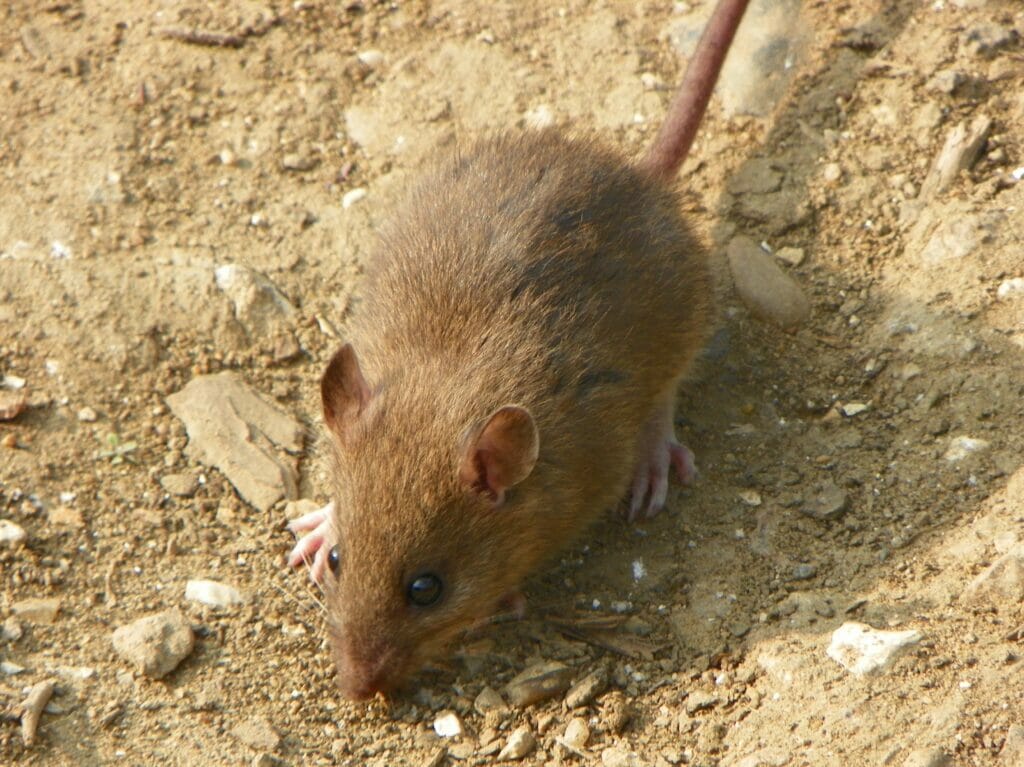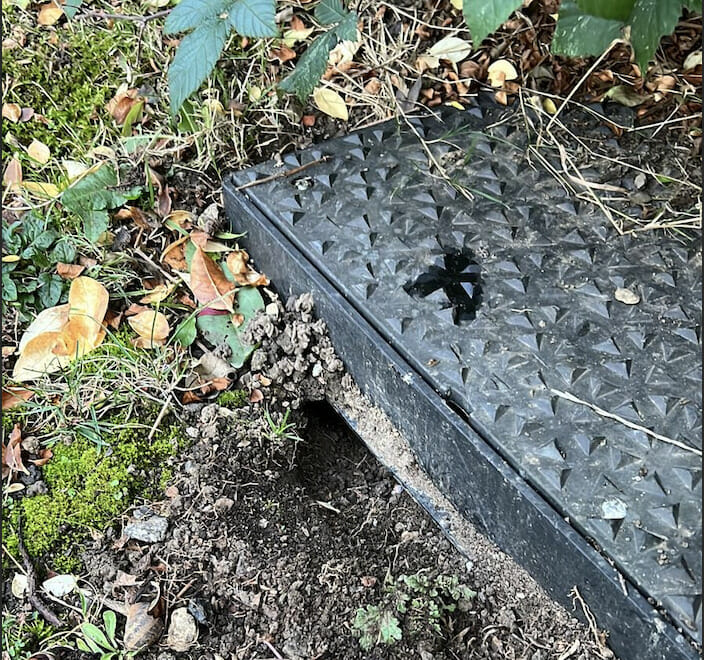Table of Contents
Rats are known to cause many problems for property owners when they infiltrate homes, but what about your garden? Rats can cause problems both inside and outside, and often, it’s much harder to identify a rat problem in your garden than it is in your home.
In this article, we share our tips for identifying the presence of rats in your garden, the damages they can cause, and how to get rid of and/or deter the little creatures.

Identifying rats in your garden
To identify rats, you need to understand their traits and behaviours. This will also assist you with determining exactly which rodent is currently occupying your garden.
Where do rats live?
Unlike mice, rats need a constant supply of water to survive. Therefore, there are essentially three things that rats look for when choosing a place to nest:
- Warmth & Protection: To meet their basic needs, rats require a dry, warm, and sheltered home.
- Food & Water: Rats require a consistent amount of food and water each day to live, and so they will build their nests in a location with easy access to both.
- Materials: To make the perfect nest, rats require a large number of various materials. Insulating their homes using leaves, grass, sticks, and household waste (cardboard, newspaper etc.).
What do rats eat?
Rats are omnivores, meaning they can eat both plants and animals. Fruits, berries, nuts and seeds make up most of a rat’s diet when they live in the wild as these are the most readily available foods. However, rats are scavengers and are known to eat anything they can get their hands on. This means that a rat’s diet is directly linked to its environment and varies based on location.
When are rats active?
Rats follow a circadian rhythm, leaving their nests to gather food, water and breed. However, this usually only happens after sunset and before sunrise, as rats are primarily nocturnal. This makes them even harder to spot in the dark, which is a pain for you if you’re trying to catch them red-handed, but a bonus for them as it helps to keep them safe from predators.
How long do rats live?
In general, the lifespan of a rat depends on its environment. Rats that are lucky enough to be kept as family pets can live for up to four years, whereas rats in the wild tend to only live between one to two years.
Signs of rats in your garden
Of course, seeing a rat in your garden with your own eyes is an explicit identifier of a rat problem. However, rats are notoriously covert when going about their tasks, so it isn’t common to see the rat itself. So instead, you can rely on these signs that are clear signals of a rat problem.
Rat droppings
Droppings are the most common indicator of any rodents’ presence, so it’s essential to know your rat droppings from your mouse droppings. Rats are quite the defecators, producing up to 40 droppings in just one night! Fortunately for us, this means they leave a trace wherever they go.
Rat droppings are typically the size and shape of an olive and can be found in large groupings. Whereas mice droppings are much smaller and elongated with a pointed end.
It can be challenging to tell the difference between rat and squirrel droppings, especially in the garden. However, the best way to tell is the location of said droppings. Squirrels leave their excrement in the same spot every time, compared to rats who use their droppings to mark their territory and spread it around as much as possible.
To learn more about squirrels, visit: are squirrels rodents?
Bite marks
Rats are rodents, and so this means that their front incisors never stop growing. To manage this, rats will constantly be gnawing away on whatever they can get their hands on. So look out for little teeth marks on wooden items, cardboard boxes and plastic coverings.
Footprints
Whether they are scavenging for their next meal or marking their territory, rats are always on the move. Fortunately for us, this means they leave a trail of their activity behind in the form of tiny footprints in the dirt. But, of course, impressions in your garden don’t automatically mean that you have a rat infestation problem – a rat may have merely entered your garden for food, for example. One way to test this hypothesis is to lay down a layer of flour or something similar and look for consistent footprints over several days.
Burrows
Rats are known for their specialist digging abilities. Another sure-fire way to spot the presence of rats in your garden is to look out for burrows in your grass and flowerbeds. If not used for shelter and nesting, rats create holes to store food, so you may notice a number of them all around your garden!
Could you be suffering from a Mole infestation? Moles will dig similar holes around your garden for shelter. Visit our mole infestation page for more information or to book a service.

Rats in the garden shed
Garden sheds provide a perfect habitat for rats, especially in the winter. They are ideal for sheltering from the weather and providing a roof over their heads. Sheds are also goldmines for food and materials that rats need to nest; often, there will be grass and plants seeds around for them to nibble on, and any clutter you have lying about makes ideal nesting material.
It is worth checking your shed for any sort of gap or crack that could be used as an ingress point by a visiting rat. Also, inspect doors and windows for gaps in seals that a rat could squeeze through.
How do rats damage gardens?
Rats cause lots of damage wherever they go, primarily due to their incessant need to be constantly gnawing away at something. Here are some of the ways rats can cause damage to your garden:
- They will eat whatever they can find: If you have a prized collection of vegetables growing or any fruit-bearing shrubs around, rats will see these as free food and take as much as possible.
- Containers and packaging: plastics and cardboard are ideal nesting materials for a rat. Any boxes you have lying around will soon be full of holes and tiny little teeth marks.
- Structural damage: to grind down their front teeth, rats will chew on almost anything. As a result, structural damage to properties and outbuildings, including sheds, caused by rats is much more common than you would think. They will gnaw their way through window frames, wooden beams, doors and even burrow through foundations to create a nest.
- Stealing bird food: if you’re a bird fan or just someone who leaves out seeds for visitors, then say goodbye to the food you bought. Any bird feeder or table will look like an open invitation to a rat, and they will take as much as they possibly can.
- Electrical wiring: rats use electrical wiring as another source to gnaw. This includes outdoor lighting, lawnmower and power tool cables, and any other sort of wiring you have in your garden.
Rats, however unintentional, can cause a lot of damage both inside and outside of your property. The longer they are left to their own devices, the more damage they will cause. As soon as you spot any sign of rats, contact our experienced team; we offer rat control services in London and the southeast of England.
Are rats dangerous?
The mere presence of rats presents dangers to you and your family. They are known transmitters of diseases – often carrying several rodent-borne viruses at one time. These include leptospirosis, which can cause kidney and liver failure; hantavirus, which causes flu-like symptoms, and difficulty breathing; and rat-bite fever, leading to pneumonia, meningitis, sepsis, and even death.
They can infect both people and pets through various methods. These include direct contact with rat droppings, scratches or rat bites, and inhalation of dust particles contaminated with rat urine. Therefore, the longer they stay in your property or garden, the higher the risk of contracting a rat-transmitted disease.
How to prevent rats in your garden
There are several actions you can take in your garden to prevent a rat infestation.
- Tidy up! Neatly mowed lawns, trimmed bushes, and a lack of weeds mean that rats don’t have a lot of room to hide.
- If you’re a keen composter or store your bins in the garden, secure them with a lid that isn’t easy to remove.
- Bird and pet food can attract pests. Try to keep them in rodent-safe containers or out of their reach.
- If you have fruit trees in your garden, pick up the fruits that have fallen onto the ground. The sugars released when these decay attract all types of pests, including rats.
- If possible, remove water sources from your garden. Ensure that your garden tap doesn’t leak, or even remove your water feature if you find it is attracting pests.
However, please remember these are deterrents, and if you already have signs of rats, speak to our expert team on 0204 566 5522.
Natural deterrents
Some plants, herbs and spices act as natural rat repellents. If you can, try to place these across your backyard to prevent rats from making your garden their home. For example, plants such as marigolds, daffodils and lavender are all despised by rats; the smell of these flowers will keep them at bay. Planting garlic bulbs is another option to deter rodents, as the strong smell plays havoc with their noses. You can also try raiding your spice rack as black and cayenne pepper, oregano, and sage are all tried and tested natural repellants of rodents. Again, sprinkle these around your garden to keep the rats at bay.
Getting rid of rats in your garden
If you have seen signs of rats, then you have a few options. As always, seeking the help of a professional pest control service is the safest route to go down for everyone involved. However, there are some DIY methods you can try out first.
How to humanely get rid of rats in your garden
If you can’t bear the thought of ending a rat’s life, then you can use non-lethal, live-capture traps. These are simply boxes with a door that uses a spring to close when a rat enters the container. They are not the most effective method of getting rid of rats, as using live traps takes a lot of patience and work.
Don’t use cheese as bait. This common myth has been disproved time and time again. Instead, opt for salty or sweet foods, such as peanut butter. Pet food is also an excellent choice for rat bait.
Glue traps
We strongly recommend that untrained individuals never use glue traps. These can result in rats injuring themselves and non-target species being caught, including pets and other wildlife! When stuck to the glue, rats will often chew through or tear off a limb or tail to escape.
Rat poison
Rat poison is something that should only ever be used by professionals. While there are options available on the market for at-home poisons, they are not effective at getting rid of rats. They are simply not strong enough, and rats are tough creatures who have actually evolved and become resistant to many of the typical DIY poisons out there. High-grade poisons are 100% effective in killing rats; however, only licensed professionals can purchase these. So, please do us a favour and leave it to us!
Natural alternatives
If you’re looking for natural alternatives to rat poison that are safer to use around your family and pets, you may already have some in your cupboards.
- Create a potent repellent recipe using minced garlic cloves, castor oil, soap, tabasco, and water. Spray this delightful mix all around your garden to keep the rats away
- Peppermint oil is another harmless substance that rats can’t seem to stand. Mix a few drops of peppermint oil with water and spray this around your garden.
- Place ammonia, or ammonia-based products, in a bowl and leave next to the entrance to their nest. This strong-smelling chemical works wonders in deterring pests.
Best way to get rid of rats in your garden
While there are several methods for deterring rats in your garden, once you have an actual rat infestation, you only really have one option… Call the professionals.
Firstly, with the number of diseases that rats carry, using DIY methods to rid your garden of rats places you and your family in grave danger. Secondly, many of these methods will work but only as deterrents. Once you have clear signs of rats in your garden, you need to get rid of them for good. Poisons and traps available to the general public are just not good enough to get the job done correctly.
Our fully qualified pest control experts are licensed to use professional-grade poisons and traps that are guaranteed to get rid of rats in your garden.
If you have queries regarding the presence of rats or pest control services in general, give us a call on 0204 566 5522.
Integrum offers professional pest control services across the southeast of England, covering Croydon, Surrey, and London.




